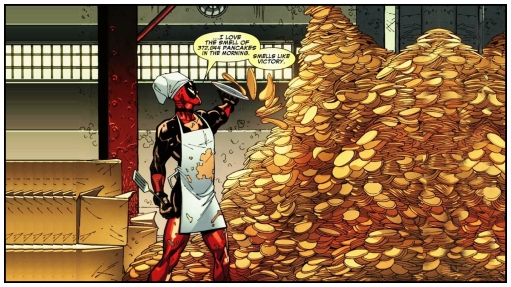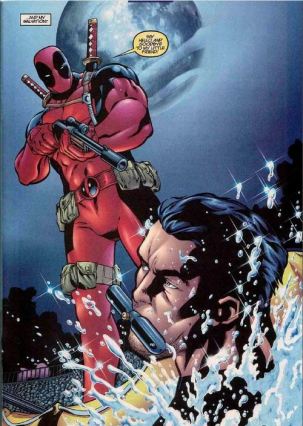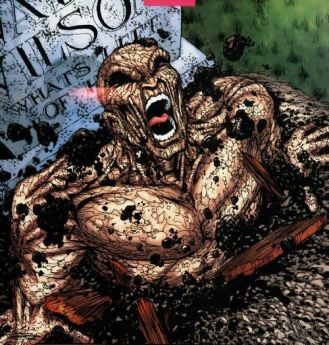This week I’ve a little translation and then a little essay. Two for the price of one. The tale has a very long title, which is this: ‘The Story from which it is inferred that Mongán was Finn mac Cumaill and the cause of the death of Fothad Airgdech’.
Mongán was sitting in state in Rathmore in Moylinney. Forgoll the poet then came to him and brought complaints from couples all over the territory to Mongán. But he did recite a new story for his king every night. His knowledge was so great and exhaustive, he had a new story every night from Halloween to May-day. Mongán repaid him with gifts and food.

One day, Mongán asked his poet about the death of Fothad Airgdech. Forgoll replied, confidently, that he was slain at Duffry in Leinster. Mongán said he was wrong. The poet took great offense. He said he would satirise Mongán with cutting verses, he would satirise his father and his mother and his grandfather. He said he would sing verses over the waters so that fish could not be caught in the estuaries. He would sing overt the woods, so that they would not bear fruit and over the plains so that they would be a barren wasteland.
Mongán tried to calm the poet’s anger, offering him gifts worth seven slave-girls, or twice seven slave-girls, or three times seven slave-girls. More than this, he offered a third of his land, or half his land, or even his whole dominion. At last, he offered the poet anything at all, the only exception being his own liberty and that of his wife, Breóthigern. He would only give Forgoll this if Mongán wasn’t proved right at the end of three days. The poet refused everything that was offered to him, except the woman. Although she was not offered Mongán could not refuse, for the sake of his honour but the she was greatly upset. Her tears fell as quickly as they could be wiped away. Mongán comforted her, as help would certainly come to them.

The third day arrived. The poet approached to enforce his claim but Mongán told him to wait until evening. In their private room, Breóthigern started weeping as she could see no help coming and it was closer to the time when the poet would claim her. Mongán said “Don’t cry, my dear. Someone is coming to help us. Even now, I hear his feet in the Labrinne river”.
So they waited. Again Breóthigern began to cry. “No tears, now”, said Mongán, “I hear the feet of the one who will help us in the Máin”.
They were like this between every two watches that day. She would weep and he husband would still say, “Don’t cry, my love. Someone is coming to help us. I hear his feet in the Laune, in Lough Leane, in Samáir between the Uí Fidgente and the Arada, in the Suir on Femin in Munster, in the Echuir, in the Barrow, in the Ruirthech, in the Boyne, in the Níth, in the Tuarthesc, in Snám Aignech, in the Nid, in the Rí, on the waters of Ollarbha in front of Rathmore”.

Finally night fell. Mongán was on his couch in the hall, with his wife at his right hand, still crying. The poet, Forgoll, was summoning all their bonds and oaths to fulfil their bargain. Just then, it was announced that a man was approaching the fort from the south. His cloak was wrapped tightly around him and in his hand was a headless spear-shaft, of not insignificant size. He used the pole to vault across the three ramparts of the fort, so that he landed in the enclosure. He then leapt into the palace. His final leap took him to the side of Mongán, his hand on the king’s pillow. The poet was at that point behind the king. They all started arguing why this mysterious stranger had come.
“What is the matter here?” asked the stranger.
“I have made a bet with that poet there”, said Mongán, “about the death of Fothad Airgdech. He said that he was killed in Duffry. I said that he was wrong”. The strange warrior agreed with Mongán, the poet was wrong.
“This is a mere peasant”, said Forgoll, “coming here, trying to contradict me”.
“I’ll not stand for that”, said the warrior. “I will prove it to you. We were all there with Finn, with you –”
“Hush!” said Mongán to the warrior, “watch what you’re saying!”
“We were all there with Finn, then”, he continued. “We had come from Scotland and we met Fothad Airgthech just over there on the Larne river. We fought a battle and I threw my spear at Fothad. It went right through him and into the ground behind him. The iron spearhead was stuck in the ground. I hold in my hand the shaft of that spear. If we go outside, you can see the stone I stood on to throw the spear, the iron spearhead will still be in the earth, and a little to the east is the grave of Fothad. He was buried with a stone chest with his two silver bracelets, arm-rings and neck torque of silver in it. The grave is marked by a stone pillar, on the bottom of which is written in ogham: ‘This is Fothad Airgdech. Cáilte slew me in a fight against Finn’.”

They all went outside with the strange warrior. Everything was as he said it would be. The stranger was Cáilte, Finn’s fosterling, who had journeyed far to see them. From this it is know that Mongán is Finn mac Cumaill, although he would not let it be said out-loud.
Now it’s time for something new: Tom tries to shoe-horn the tale into some kind of modern relevance. This week: Mongán is Deadpool.
I’m not saying that this is the best way of introducing my theory about Mongán being the medieval version of Deadpool, but it is short and should have some of the salient features. This story demonstrates some of the tenacity of Mongán. He survives through the ages, from the mythical past of Finn mac Cumaill to the narrative present. Like many exceptionally long-lived Irish characters he has gone through a transformation – although in this case he transformed from one human into another. Sure, this isn’t an exceptional healing factor but it does make him very difficult to kill.
Also, Finn mac Cumaill is a very famous literary figure. You know this, you’re a well-read person. Mongán is taking on the role of a literary character much in the same way as Deadpool knows he’s a comic book character. This is why he can make references to all sort of crap from outside the Marvel universe. In other texts Mongán is shown to have incredible poetic knowledge. Given the literary nature of life in medieval Ireland (if you believe the literature), this gives Mongán the advantage of knowing his place, the world, and his place in the world.
The last thing I want to point out is the most difficult. We all know Deadpool is a funny character. At least, he tries to be funny. I’ll leave the final judgement up to you, discerning reader. Does Mongán attain these same heights of comedy? I think the humour is here, but it is hard to see in a text that’s 800-1,000 years old. This tale shows Mongán’s favourite tactic of humiliating the poet, Forgoll. The poet is usually the ignorant straight-man for Mongán to demonstrate his superior skill to. I’m not saying that Forgoll can do everything a spider can, but I think the relationship has echoes for our merc with a mouth.
I’m sure this isn’t water tight. You’ll all have objections of a Celtic studies, comic book, or both variety. But this is the kind of thing that I think about everyday, so you’ve an insight into my head here. Also, can you blame a guy for trying to jump on a passing bandwagon?

